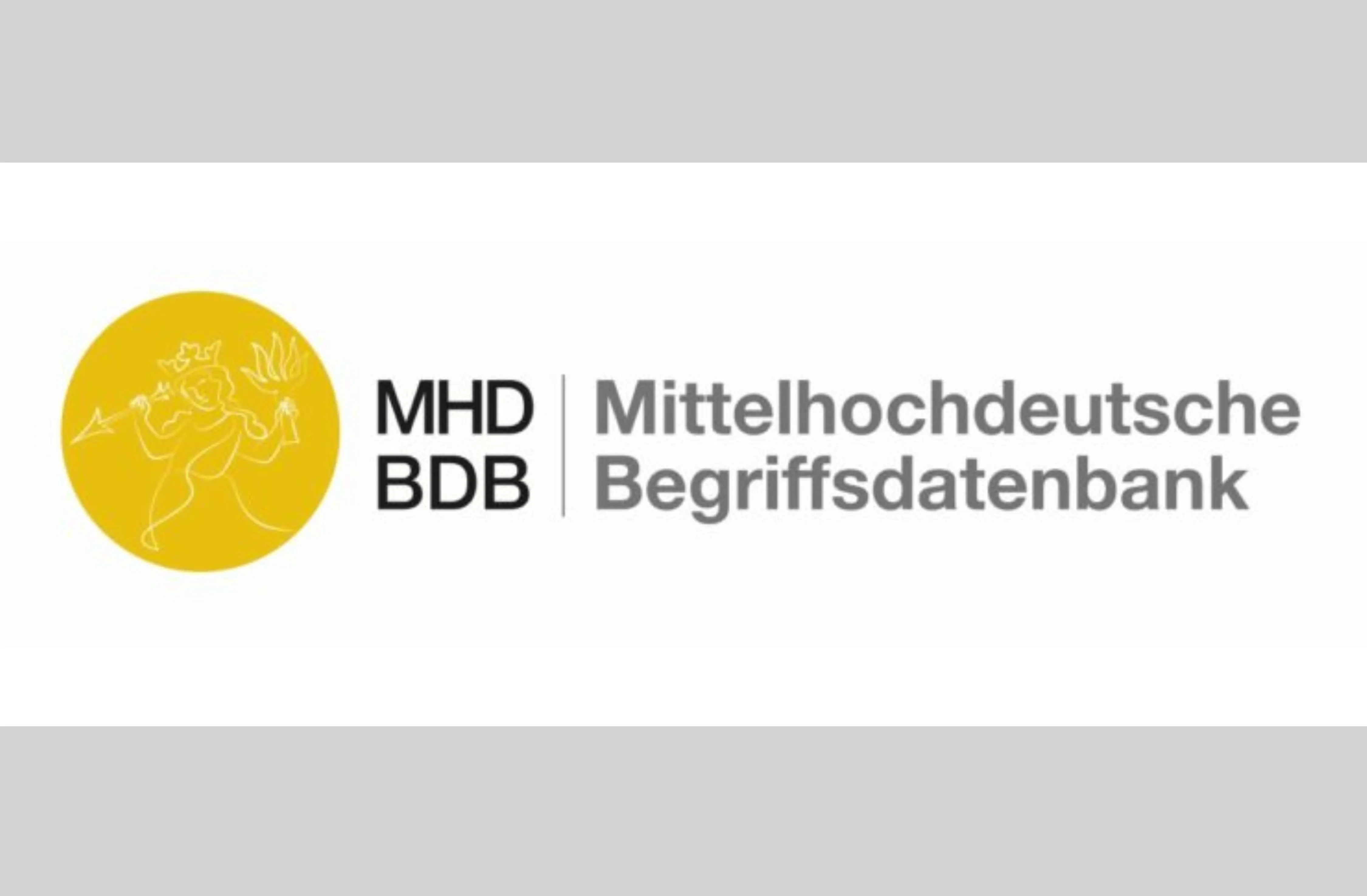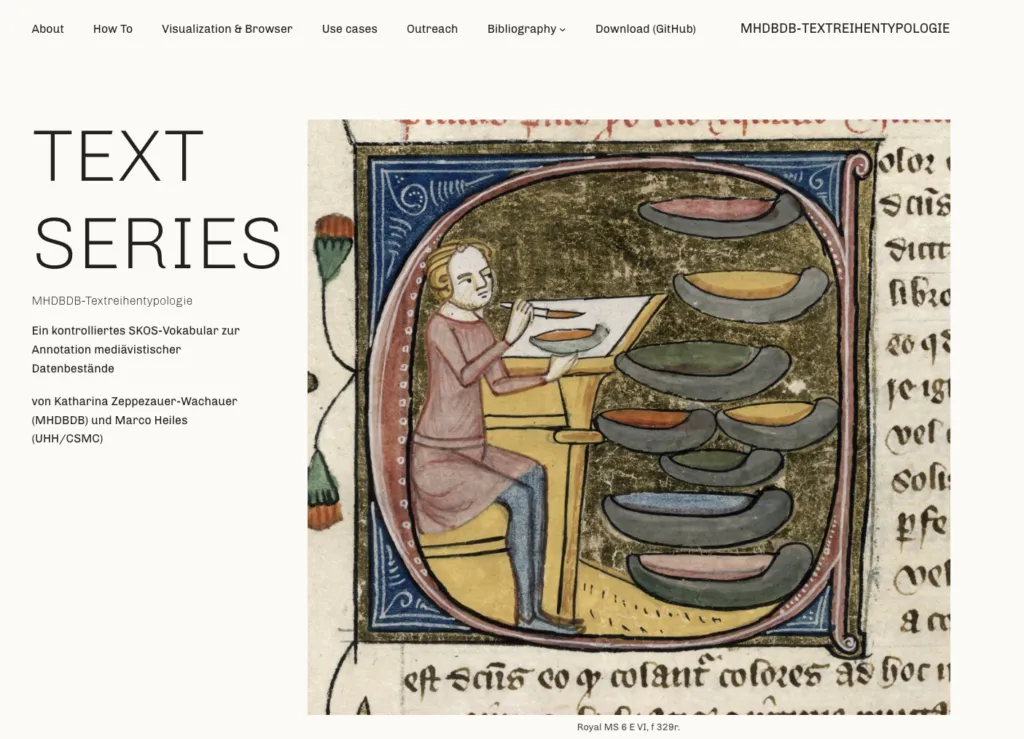
Digital Sustainability: Relaunch of the MHDBDB
- Hosting organisations
- Universität Salzburg and Uni Salzburg - Mittelhochdeutsche Begriffsdatenbank (MHDBDB)
- Responsible persons
- Katharina Zeppezauer-Wachauer
- Start
- End
The Middle High German Conceptual Database ( MHDBDB ) is a freely accessible, complex search engine for medieval and early modern literature. It provides access to the most important works of Middle High German poetry and numerous other texts from a variety of perspectives via an extremely versatile search function. The MHDBDB was founded in the early 1970s, has been online as an information system since 1995, has been maintained at the University of Salzburg since 2002, and was donated to the University of Salzburg in 2016. Currently, a complete redesign and migration is under development; this project is a part of that process. The existing texts will be converted into the XML-TEI format and metadata managed according to RDF standards. A new query language will make the complex searches intuitive to use. The website will have a responsive design and become faster. The linkage with external data sources (e.g. the Semantic Web like LOD) as well as the export of the data into the most different formats and the full access to most texts will be possible in the future. As of August 2019, there are 666 texts in the corpus of the MHDBDB.
The current frontend is past its prime and is in urgent need of general renovation. Therefore preparations are already being made for a relaunch, for which, however, neither the required financial nor the human resources have been made available to date. The aim of the project is to provide the necessary IT and development basis to enable interoperability, accessibility, re-usability and sustainability of existing data.
Keywords: Middle High German, TEI, database, RDF, SKOS, OWL, ontology, semantic web vocabularies, semantic web, LOD, german studies, middle ages, literary studies
Outcomes
The new MHDBDB now relies on a data model based on various semantic web technologies, such as RDF vocabularies and ontologies, as well as TEI for encoding the corpus texts. TEI texts were linked to Linked Open Data (LOD) using the stand-off method. Annotations such as Part of Speech (PoS) or phrase and sentence structures were directly related to the tokens of the texts. The linking between RDF and TEI data is carried out using the Web Annotation Vocabulary in accordance with the recommendation of the W3 consortium. The term system, the onomastic naming system and the new MHDBDB text series typology (for categories, genres and text types of the Middle Ages and early modern period) were described as controlled vocabularies or thesauri using the Simple Knowledge Organisation System (SKOS). Lemmata were coded according to the specifications of the OntoLex-Lemon lexicography module. Other ontologies and vocabularies used are BibFrame 2.0 and the GND Ontology.
Standardisation data from the Gemeinsame Normdatei (GND) and Wikidata are now reused in the MHDBDB to give users better access to the data material. Networking with metadata repositories enables the mutual enrichment of data. All research data such as annotations, bibliographic metadata and descriptive metadata on people, time, places and events (based on the CIDOC Conceptual Reference Model (CRM) for cultural heritage data) are linked to the Semantic Web.
All MHDBDB data is provided under a Creative Commons licence (CC BY-NC-SA 3.0 AT). The MHDBDB uses Java in combination with Spring Boot, which ensures a robust and scalable backend solution.

- Marco Heiles und Katharina Zeppezauer-Wachauer: **Poster: MHDBDB-Textreihentypologie. Ein kontrolliertes SKOS-Vokabular zur Annotation mediävistischer Datenbestände **(Version 1.0.1). 2023. Für die Tagung „Archäologie der Handschrift – Erschließung, Präsentation und Forschung im digitalen Raum”, Freiburg im Breisgau, 9.-11. Oktober 2023. http://doi.org/10.25592/uhhfdm.13381
- Alan Lena van Beek und Katharina Zeppezauer-Wachauer: Poster. Mittelhochdeutsche Begriffsdatenbank 2023. 2023. Für die Tagung “Materiality and Virtuality.: Entanglements of Material and Virtual Worlds in Medieval and Early Modern Material Culture”, Krems an der Donau, Österreich, 19. – 21. September 2023. https://doi.org/10.5281/zenodo.8375554
- Katharina Zeppezauer-Wachauer and Marco Heiles: Eine digitale Textreihentypologie für deutschsprachige Texte des Mittelalters und der Frühen Neuzeit. Showcase eines kontrollierten Vokabulars in SKOS, in: Mittelalter. Interdisziplinäre Forschung und Rezeptionsgeschichte 6 (2023), S. 6–39, DOI: https://doi.org/10.26012/mittelalter-30680 .
- Marco Heiles and Katharina Zeppezauer-Wachauer: Textreihen. Eine digitale Textreihentypologie der historischen Wissens- und Gebrauchsliteratur als LOD. Vortrag im 7. HWGL-Abendkolloquium des Netzwerks Historische Wissens- und Gebrauchliteratur e.V., digitale Veranstaltung über Zoom, 22.06.2023, 18.00 Uhr: https://hwgl.hypotheses.org/2277 .
- Workshop “Schnittstelle Mediävistik” (co-funding with CLARIAH-AT and DFG): https://clariah.at/de/events/workshop-interface-of-medieval-studies ;
https://offenesmittelalter.org/2023/04/26/arbeitstreffen-4-schnittstelle-mediaevistik/;
Keynote Prof. Andrea Rapp (TU Darmstadt): https://unitv.org/beitrag.asp?ID=1142 . - Alan Lena van Beek and Luise Borek: Workshop “Schnittstelle Mediävistik” im Rahmen des DFG-Netzwerks “Netzwerk Offenes Mittelalter” zu Linked Open Data, in: Mittelalter. Interdisziplinäre Forschung und Rezeptionsgeschichte, 18. Mai 2023. https://mittelalter.hypotheses.org/30356.
- Katharina Zeppezauer-Wachauer & Marco Heiles: mhdbdb text series – Textreihentypologie: controlled vocabulary in SKOS. DOI: 10.25592/uhhfdm.12414; GitHub: https://github.com/Middle-High-German-Conceptual-Database/textseries ; Interface: http://mhdbdb.sbg.ac.at/Textreihen/
- Mittelhochdeutsche Begriffsdatenbank: Öffentliche Zotero Group Library. https://www.zotero.org/groups/5043625/mittelhochdeutsche_begriffsdatenbank/library
DOI: 10.60646/MHDBDB
Additionally, the MHDBD was presented within the framework of the “Dazzling Data” Lecture Circuit at the University of Salzburg, a recording of the lecture is available via YouTube:
Mittelhochdeutsche Begriffsdatenbank Reloaded